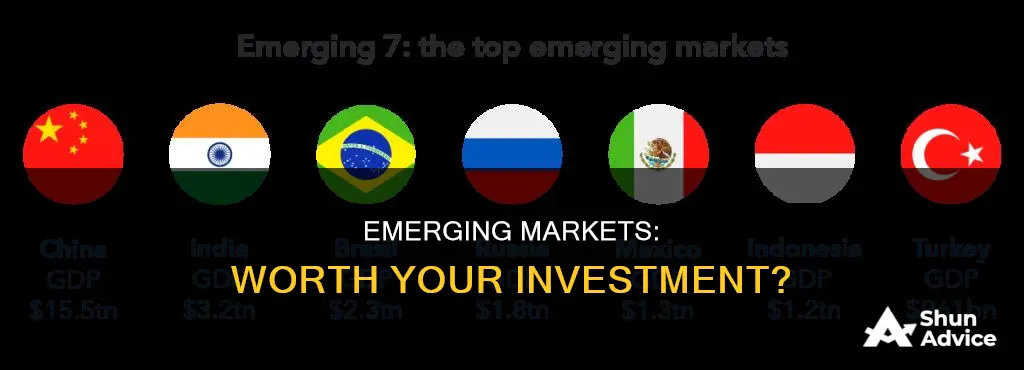
Investing in emerging markets can be a double-edged sword. On the one hand, these markets offer high growth potential and diversification benefits, but on the other hand, they come with significant risks that investors should be aware of. So, should you invest more in emerging markets? The answer depends on your risk appetite and investment goals.
Emerging markets refer to economies that are rapidly growing but have not yet reached the level of developed markets. They are characterised by volatile markets, higher growth and investment potential, and stronger economic growth driven by factors like industrialisation, favourable demographics, and investments in technology and infrastructure. These markets account for a significant portion of global economic growth and consumption, providing investors with exposure to companies in fast-growing countries.
The rewards of investing in emerging markets can be substantial. The biggest advantage is the potential for high growth, with some markets experiencing explosive growth. Additionally, international investments in these markets can act as a good diversifier for an investment portfolio, as economic downturns in one country or region can be offset by growth in another.
However, investing in emerging markets also carries considerable risks. These include political risk, where unstable governments or political unrest can negatively impact the economy and investors. There is also economic risk, as these markets may suffer from insufficient resources, high inflation or deflation, unregulated markets, and unsound monetary policies. Currency risk is another critical factor, as the value of emerging market currencies compared to the dollar can be highly volatile, impacting investment returns.
So, while emerging markets offer attractive growth and diversification opportunities, investors should carefully consider their risk tolerance and conduct thorough research before allocating a significant portion of their portfolio to these markets.
| Characteristics | Values |
|---|---|
| Potential Returns | High growth potential, with some markets experiencing explosive growth |
| Diversification | Exposure to a broader set of geographies, businesses, and local economies |
| Risk | High risk, including political risk, economic risk, and currency risk |
| Volatility | More volatile than developed markets, with boom-and-bust business cycles |
| Growth | Rapid economic growth, with higher growth and investment potential |
| Population | Younger populations relative to developed economies |
| Government Influence | Political instability and government influence can negatively impact investments |
| Market Efficiency | Complexity and varying legal systems reduce market efficiency |
What You'll Learn

What are emerging markets?
The term "emerging markets" was coined by economists in the early 1980s to refer to investing in developing countries. There is no universally agreed-upon definition, but emerging markets are generally understood to be countries transitioning from the "developing" phase to the "developed" phase. They are characterised by rapid growth, market volatility, and high investment potential.
Emerging markets are typically in the process of industrialising, moving away from agricultural and resource extraction activities towards manufacturing and industrial activities. They tend to have younger populations relative to developed countries, as well as governments that encourage economic growth through policies favouring industrialisation and investment in technology, infrastructure, and education.
Emerging markets are attractive to investors due to their high growth potential and the prospect of high returns on investment. However, they also come with higher risks due to factors such as political instability, currency volatility, and illiquid equity.
Some examples of emerging markets include Brazil, Russia, India, China, and South Africa, collectively known as the BRICS countries. Other notable emerging markets include Mexico, Saudi Arabia, Iran, and South Korea.
Best Platforms for Direct Mutual Fund Investments
You may want to see also

What are the risks of investing in emerging markets?
Investing in emerging markets can be a risky endeavour due to the potential for political and economic instability, currency fluctuations, and regulatory risks. These risks can lead to significant losses for investors, so it is important to carefully consider them before deciding to invest.
One of the main risks of investing in emerging markets is political instability. Emerging markets may have volatile governments, and political unrest or changes in government policies can seriously impact the economy and investors. For example, the Western boycott of Russian companies following the 2022 invasion of Ukraine significantly downgraded the value of Russian investments. Political risk also refers to the uncertainty of adverse government actions and decisions, which can include the possibility of war, tax increases, changes in market policy, and laws regarding resource extraction.
Economic instability is another concern. Emerging markets may suffer from insufficient labour and raw materials, high inflation or deflation, unregulated markets, and unsound monetary policies. These factors can create challenges for investors and impact the potential returns on their investments. Additionally, emerging markets are often dependent on raw materials for economic growth, so price pressure in the commodities markets can affect their stability.
Currency risk is also a significant factor. The value of emerging market currencies compared to other currencies, such as the US dollar, can be extremely volatile. Currency devaluation or a significant drop in value can erode the value of an investment and lessen any investment gains. For example, a strong US dollar can hurt emerging markets as many of these countries have dollar-denominated debt, which becomes harder to fund when the dollar rises.
Regulatory risk is another issue to consider. Emerging markets may have less developed regulatory systems, resulting in greater uncertainty for investors. This can include weak corporate governance, inadequate legal protections, and regulatory changes that negatively affect investments. Lax insider trading restrictions in emerging markets can also lead to market inefficiencies and extreme speculation, impacting the stability of investments.
Other risks associated with investing in emerging markets include liquidity risk, where emerging markets may have less developed financial markets, making it difficult to buy or sell securities at desired prices. Additionally, emerging markets may face challenges in raising capital due to poorly developed banking systems, increasing the cost of capital for firms.
While investing in emerging markets carries these risks, it is important to note that there can also be potential rewards. Emerging markets offer high growth potential due to their rapid economic growth rates, abundant natural resources, growing consumer bases, and low labour costs. However, investors need to carefully weigh the risks and conduct thorough research before making any investment decisions in these markets.
Establishing a Private Investment Fund: A Comprehensive Guide
You may want to see also

What are the benefits of investing in emerging markets?
Investing in emerging markets can be a double-edged sword, offering both high risks and high rewards. Here are some of the benefits of investing in emerging markets:
High Growth Potential
Emerging markets are known for their rapid economic growth, often experiencing higher growth rates than developed countries. This growth provides a fertile environment for businesses to expand and increase their earnings, which can translate into attractive returns for investors.
Diversification
By investing in emerging markets, you can gain exposure to a diverse range of companies and industries, reducing the risk of putting all your eggs in one basket. This diversification can help balance out the volatility often associated with emerging markets and provide a hedge against downturns in developed markets.
Competitive Advantage
Many emerging markets have a competitive advantage in exporting low-cost raw goods and commodities to richer nations. This advantage can drive economic growth and make these markets attractive investment destinations.
Strong Fundamentals
Emerging markets often have favourable demographics, with younger populations that can fuel consumption and economic growth. Additionally, governments in these markets often encourage industrialization, invest in technology, infrastructure, and education, and adopt market-friendly policies to attract foreign investment.
Attractive Valuations
Emerging markets can offer attractive entry points for investors due to their lower valuations compared to developed markets. This means that, despite the risks, the potential for higher returns exists, especially if you can identify hidden gems or companies with strong growth potential.
Industry-Leading Companies
While emerging economies may still be developing, many companies within these markets are already leaders in their respective fields. For example, Asia's tech sector boasts numerous world leaders in semiconductor chips, electric vehicle components, and online entertainment.
In summary, investing in emerging markets can provide access to high-growth opportunities, diversification, competitive advantages, strong economic fundamentals, and attractive valuations. However, it is important to remember that these markets also come with heightened risks, including political instability, economic setbacks, and volatility. Therefore, a cautious and well-informed approach is necessary when considering investing in emerging markets.
Hedge Fund Investment: Choosing the Right One
You may want to see also

How do I invest in emerging markets?
Investing in emerging markets can be a great way to diversify your portfolio and gain exposure to high-growth economies. However, it is important to carefully consider the risks involved, as emerging markets can be volatile due to their reliance on commodity exports, political instability, and other factors. Here are some detailed instructions on how to invest in emerging markets:
Step 1: Understand the Risks and Rewards
Emerging markets are economies that are in the process of rapid growth and development. They offer high potential returns but also carry higher risks compared to developed markets. The biggest advantages of investing in emerging markets are the potential for high growth and diversification. By investing in these markets, you can gain exposure to companies in countries with strong economic growth, such as Brazil, Russia, India, China, and South Korea.
However, there are several risks to consider. Political risk is a significant factor, as unstable governments or political unrest can negatively impact the economy and investors. Economic risks include insufficient resources, high inflation, unregulated markets, and unsound monetary policies. Currency risk is another critical factor, as the value of emerging market currencies can fluctuate significantly compared to the dollar.
Step 2: Decide on Your Investment Vehicle
There are several ways to invest in emerging markets, including mutual funds, exchange-traded funds (ETFs), and American Depositary Receipts (ADRs). Mutual funds and ETFs are popular choices as they offer diversification by holding a blend of stocks from various sectors and countries. ETFs are particularly attractive as they provide exposure to a specific region or country, such as the Vanguard Emerging Markets ETF (VWO) or the iShares MSCI Emerging Markets ETF (EEM).
ADRs are non-U.S. company stocks that trade on U.S. stock exchanges, allowing you to invest in companies like Taiwan Semiconductor Manufacturing (TSM) or Indian bank ICICI Bank (IBN).
Step 3: Conduct Thorough Research
Before investing in any emerging market, it is crucial to conduct extensive research. Examine the type of economy, political governance, and regulatory practices of the country or region. Look for markets with stable political environments and consistent economic growth. It is also important to assess the risk factors mentioned earlier, such as political and economic stability, currency volatility, and the potential impact of natural disasters.
Additionally, consider the specific companies or sectors you want to invest in within these markets. Evaluate their financial health, growth prospects, and the overall investment climate in the region.
Step 4: Consult a Financial Advisor
Consider consulting a financial advisor who has experience in international investments. They can help you tailor your investment strategy based on your risk tolerance, investment goals, and current portfolio allocation. A financial advisor can also provide valuable insights into global economic trends and geopolitical events that may affect your investments.
Step 5: Monitor and Adjust Your Investments
Investing in emerging markets requires a long-term perspective due to their volatile nature. Stay informed about economic and geopolitical developments that may impact your investments. Be prepared to adjust your strategy as needed, and remember that patience is crucial when investing in these dynamic markets.
In summary, investing in emerging markets can offer significant growth potential and diversification benefits. However, it is important to carefully consider the risks, conduct thorough research, and seek expert advice before making any investment decisions. By following these steps, you can make informed choices about investing in emerging markets and potentially enhance your investment portfolio.
Life Settlement Funds: A Smart Investment Strategy
You may want to see also

How much of my portfolio should be in emerging markets?
There is no one-size-fits-all answer to this question, as the appropriate allocation of emerging markets in an investment portfolio will vary depending on an individual's risk tolerance, investment goals, and financial situation. However, here are some general considerations and guidelines to help you make an informed decision:
Understanding Emerging Markets
Emerging markets refer to economies that are in the process of rapid growth and development but have not yet reached the level of mature, developed economies. They are characterised by higher growth and investment potential, stronger economic growth, and volatile markets. Examples of emerging markets include Brazil, Russia, India, China, and South Africa.
Advantages of Investing in Emerging Markets
- Growth Potential: Emerging markets offer the potential for high growth due to their rapid economic development.
- Diversification: Investing in emerging markets can provide diversification benefits to your portfolio. By investing internationally, you can reduce the impact of economic downturns in any single country or region, including the US.
- High Returns: With higher risk comes the potential for higher returns. Emerging markets can provide access to companies in fast-growing countries, offering enthusiastic episodes of growth.
Risks of Investing in Emerging Markets
- Political Risk: Emerging markets may have unstable or volatile governments. Political unrest or changes in policies can negatively impact the economy and investors.
- Economic Risk: These markets may suffer from insufficient resources, high inflation or deflation, unregulated markets, and unsound monetary policies.
- Currency Risk: The value of emerging market currencies compared to the US dollar can be highly volatile. Currency devaluation or significant drops in value can reduce investment gains.
- Market Complexity: Emerging markets often have varying legal systems, market structures, and instability, creating a complex investment environment that increases risk.
- Geopolitical Instability: Emerging markets are more prone to geopolitical instability, which can have negative economic consequences.
Factors to Consider
When deciding how much of your portfolio to allocate to emerging markets, consider the following factors:
- Risk Tolerance: Assess your personal risk tolerance. Emerging markets carry higher risks, so if you have a low-risk tolerance, you may want to allocate a smaller portion of your portfolio to these markets.
- Investment Goals: Consider your investment goals and time horizon. If you are seeking long-term growth and can withstand short-term volatility, emerging markets may be a good option.
- Diversification: Evaluate the current diversification of your portfolio. If you already have significant international exposure or investments in developed markets, you may want to allocate a smaller portion to emerging markets to maintain a balanced portfolio.
- Expert Recommendations: Many investment experts recommend not devoting a large chunk of your portfolio to emerging markets due to their higher risk and volatility. Suggested allocations range from 5% to 10% of your total portfolio.
In conclusion, the decision of how much to allocate to emerging markets depends on your personal circumstances and investment strategy. While emerging markets offer attractive growth potential and diversification benefits, they also carry higher risks. By carefully considering the advantages and risks, aligning your investments with your financial goals, and staying informed about global economic trends, you can make a more informed decision about the appropriate allocation of emerging markets in your portfolio.
A Guide to Investing in Universa Funds
You may want to see also
Frequently asked questions
Emerging markets offer high growth potential and diversification for your investment portfolio. They also tend to have a strong growth component, meaning that investors can get higher returns in these assets during periods of robust economic growth.
Emerging markets are typically considered riskier than developed markets due to their higher volatility. They may have unstable governments, political unrest, insufficient resources, flawed monetary policies, and currency risk. These factors can negatively impact economic growth and investment returns.
You can gain exposure to emerging markets through exchange-traded funds (ETFs) or mutual funds that specialize in these markets. These funds offer diversification across different emerging markets and remove the need for researching each market individually.







